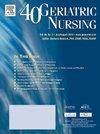社区老年人抑郁、孤独与残疾风险的关系
IF 2.5
3区 医学
Q3 GERIATRICS & GERONTOLOGY
引用次数: 0
摘要
这项研究的目的是研究在社区居住的老年人中,经历过抑郁或孤独的老年人与经历过两者的老年人相比,残疾的风险是否降低。该样本包括5005名老年人。从基线开始对参与者进行为期两年的残疾发生率跟踪调查。根据孤独和抑郁症状的存在,他们被分为四组。Cox比例风险模型对混杂因素进行了调整,用于检查它们与残疾发生率的关系。共病组、抑郁组、孤独组和健康组的残疾发生率分别为11.6%、6.9%、5.3%和4.2%。单纯抑郁组(HR 0.59, 95% CI 0.36-0.96)、单纯孤独组(HR 0.44, 95% CI 0.31-0.62)和健康组(HR 0.34, 95% CI 0.25-0.46)与共病组相比,致残风险显著降低。结论是,减轻抑郁或孤独可能会降低未来残疾的风险。本文章由计算机程序翻译,如有差异,请以英文原文为准。
Association of depression and loneliness with risk of disability among community-dwelling older adults
This study aimed to examine whether the risk of disabilities was reduced among community-dwelling older adults who experienced either depression or loneliness compared with those who experienced both. This sample included 5,005 older adults. Participants were followed for two years from baseline for incidence of disability. They were classified into four groups based on the presence of loneliness and depressive symptoms. The Cox proportional-hazards model, adjusted for confounders, was used to examine their associations with the incidence of disability. The incidence of disability in the comorbid, depression-only, loneliness-only, and robust groups was 11.6 %, 6.9 %, 5.3 %, and 4.2 %, respectively. The depression-only (HR 0.59, 95 % CI 0.36‒0.96), loneliness-only (HR 0.44, 95 % CI 0.31‒0.62), and robust groups (HR 0.34, 95 % CI 0.25‒0.46) had a significantly lower risk of disability compared with the comorbid group. It was concluded that alleviating depression or loneliness may reduce the risk of future disability.
求助全文
通过发布文献求助,成功后即可免费获取论文全文。
去求助
来源期刊

Geriatric Nursing
医学-护理
CiteScore
3.80
自引率
7.40%
发文量
257
审稿时长
>12 weeks
期刊介绍:
Geriatric Nursing is a comprehensive source for clinical information and management advice relating to the care of older adults. The journal''s peer-reviewed articles report the latest developments in the management of acute and chronic disorders and provide practical advice on care of older adults across the long term continuum. Geriatric Nursing addresses current issues related to drugs, advance directives, staff development and management, legal issues, client and caregiver education, infection control, and other topics. The journal is written specifically for nurses and nurse practitioners who work with older adults in any care setting.
 求助内容:
求助内容: 应助结果提醒方式:
应助结果提醒方式:


